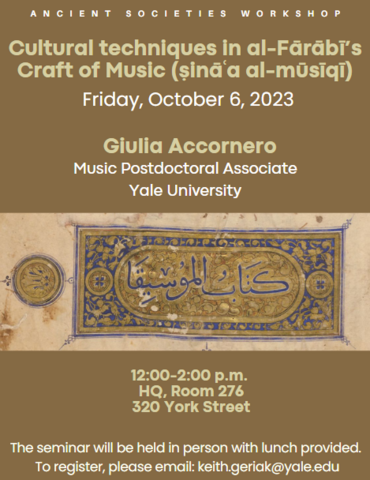Cultural techniques in al-Fārābī’s Craft of Music (ṣināʿa al-mūsīqī)
Giulia Accornero
Music Postdoctoral Associate, Yale University
The philosopher, music theorist, and polymath Abū Naṣr Muḥammad al-Fārābī (d. 950) dedicated his Great Book of Music, the Book of Rhythms, and the Book for the Classification of Rhythms to the exposition of what he called ṣināʿa al-mūsīqī. ṣināʿa constitutes the Arabic translation of the Greek word technē, and so we can say that these works dwells on the craft of music. This talk thus takes Aristotle’s notion of technē as the point of reference for al-Fārābī, who was an avid reader and commentator of the Stagirite, in asking: what does it mean for al-Fārābī to write (and read) about the ṣināʿa of music? And how does ṣināʿa relate to the theory (naẓarīya) and practice (ʿamlīya) of music? By comparing how al-Fārābī formalizes these notions against how he presents the ṣināʿa al-mūsīqī in his discussion of rhythmic theory, I shed light on the activities that form the basis of al-Fārābī’s craft of music. In particular, I argue that “diagrammatic thinking” is the fundamental activity—or cultural technique—for bringing a melody into existence. I conclude by suggesting that a focus on the cultural techniques implied in music-theoretical treatises, rather than their theoretical propositions, can provide a methodological path for comparative study.
